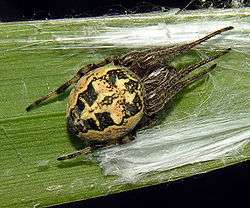Glossary of arachnology terms
This glossary describes the terms used in the formal descriptions of arachnids, particularly spiders.
Terms
- Apophysis: a process or outgrowth of the exoskeleton from any part of the body, but particularly on the appendages
Head and body
- Abdomen or opisthosoma: One of two body segments, towards the posterior end.
- Carapace: The upper (dorsal) portion of the cephalothorax.
- Cephalothorax or prosoma: One of two body segments, towards the anterior end.
- Chelicera: The appendage that includes the fang. (Sometimes called the jaw.)
- Clypeus: the area of the carapace between the anterior eyes and the anterior edge of the carapace.
- Dorsum: The upper (dorsal) portion of the body or abdomen.
- Dorsal groove: Another name for the fovea of the carapace.[1]
- Fovea: A depression or pit in the centre of the carapace of a spider marking an inward projection of the exoskeleton to which stomach muscles are attached.[2]
- Labio-sternum mound: A mound separating the labium from the sternum, found in found in some tarantulas, where it can be a diagnostic feature.[3]
- Sternum: The lower (ventral) portion of the cephalothorax.
- Thoracic furrow: Another name for the fovea of the carapace.[4]
- Venter (or ventrum): The lower (ventral) portion of the body or abdomen.
Legs and palps
- Segments:
- Coxa : first leg segment, between body and trochanter.
- Trochanter : second leg segment, between coxa and femur
- Femur : third leg segment, between trochanter and tibia.
- Patella: fourth leg segment, between femur and tibia.
- Tibia : fifth leg segment, between patella and metatarsus.
- Metatarsus (or basitarsus): sixth leg segment, between tibia and tarsus; absent in the pedipalp.
- Tarsus (or telotarsus): seventh (last) leg segment, after the metatarsus.
- Lateral (applied to legs): viewed from above or below, the sides of the leg or palp, i.e. the surfaces parallel to the line of sight
- Prolateral: viewed from above or below, the side of the leg or palp nearest the mouth, i.e. the side facing forward
- Retrolateral: viewed from above or below, the side of the leg or palp furthest from the mouth, i.e. the side facing backwards
Pedipalp
- Maxilla: modified coxa of the pedipalp, used in feeding.
- Carpoblem: the principal tibial apophysis on the male pedipalp. (Typically, this is just called the tibial apophysis.)
- Retrolateral tibial apophysis: a backward-facing projection on the tibia of the male pedipalp.
Markings

Larinioides cornutus spider showing folium on abdomen
- Folium : A broad leaf-like marking along the medial line of the top of the abdomen.
- Heart mark : A narrow marking along the top of the abdomen roughly corresponding to the location of the heart.
Abbreviations
Some abbreviations commonly found in descriptions of spider anatomy include:
- ALE: anterior lateral eyes
- ALS: anterior lateral spinnerets
- AME: anterior median eyes
- DTA: dorsal tegular apophysis
- DTiA: dorsal tibial apophysis
- LTA: lateral tegular apophysis
- MOQ: median ocular quadrangle
- PLE: posterior lateral eyes
- PLS: posterior lateral spinnerets
- PME: posterior median eyes
- PMS: posterior median spinnerets
- RCF: retrolateral cymbial fold
- RTA: retrolateral tibial apophysis
- VTA: ventral tegular apophysis
- VTiA: ventral tibial apophysis
See also
References
- ↑ Foelix 2011, p. 17.
- ↑ Roberts 1995, pp. 13–14.
- ↑ Smith, A. M. (1990). Baboon spiders: Tarantulas of Africa and the Middle East. Fitzgerald Publishing, London, pp. 1-142
- ↑ Foelix 2011, p. 18.
Bibliography
- Foelix, Rainer F. (2011). Biology of Spiders (3rd p/b ed.). Oxford University Press. ISBN 978-0-19-973482-5.
- Comstock, John Henry (1920) [First published 1912]. The Spider Book. Doubleday, Page & Company.
- Roberts, Michael J. (1995). Spiders of Britain & Northern Europe. London: HarperCollins. ISBN 978-0-00-219981-0.
This article is issued from Wikipedia - version of the 7/20/2016. The text is available under the Creative Commons Attribution/Share Alike but additional terms may apply for the media files.